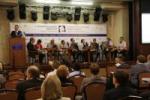- عربي
- Ukraine
- Economy
-
Investment
- Current Investment Trends
- Legal Conditions of Doing Business
- Investment Policy
- Competition
- Setting a Business in Ukraine
- Mergers and Acquisitions
- Taxation
- Import and Export
- Banks and Bank Regulation
- Convertibility and Profits Repatriation
- Currency Regulation
- Protection of Intellectual Property Rights
- Companies
- Travel to Ukraine
- About us
- Useful Sites
- Gallery
- News
Currency rates in UAH
| AED | ||
| BHD | ||
| EGP | ||
| KWD | ||
| LBP | ||
| OMR | ||
| QAR | ||
| SAR | ||
| SYP |
2015-07-06
| Kiev |  |
+32 |
| Donetsk |  |
+28 |
| Dnipropetrovsk |  |
+31 |
| Lviv |  |
+31 |
| Odessa |  |
+27 |
Current Investment Trends
Foreign Direct Investment
While small compared to the amount of foreign direct investment inflows detected in neighboring Central European countries, Ukraine has observed a steady surge of investment inflows since the Orange Revolution of 2004 slapped the country onto the radar screens of Western investors.
Increasing in the recent years, the FDI flux into Ukraine have slowed down due to the global recession and the severe economic crisis affecting the country. After having recovered in 2010 (23.7% increase on 2009), the FDI flux reduced, declining from 4.13 billion USD in 2012 to 2.86 billion USD in 2013.
In 2014 Ukraine climbed 16 places to 96 in the World Bank’s “Doing Business” rankings – earning the “Most Improved” award. During 2014 the government streamlined the process to start a business by eliminating both the need for registration with the statistics authority and the fee for value added tax registration. Authorities now process construction permits through a risk-based approval system, eliminating requirements for certain approvals and technical conditions and simplifying the process for registering real estate ownership rights. The Government of Ukraine simplified property registration and transfer processes. Ukraine is also facilitating cross-border trade by releasing customs declarations more quickly and reducing the number of physical inspections. Finally, the government introduced an electronic system for filing and paying labor taxes. In addition to the efforts of central authorities, officials at local levels continue looking to attract investment and jobs to their regions. In many instances, these local officials have become willing partners for investors in need of land or permits, which frequently are controlled below the national levels.
Despite a reform-minded government, FDI has fallen precipitously in reaction to multiple, concurrent crises: continued instability in the East, and the unlawful occupation and illegal annexation of Crimea by Russia, and a weak economy more generally. FDI is not expected to reach previous levels until 2016 at the earliest.
Foreign Exchange
The Ukrainian Government announced in February 2015 its intention to relax foreign exchange restrictions, as part of a resolution requiring a three-day advanced application for the purchase of hard currency and a requirement of confirmation of the absence of tax arrears. The regulation also bans the purchase foreign currency using loans in the local currency (hryvnia) and requires a letter of credit confirming the hard currency transaction in amounts exceeding USD 500,000.
Hard currency transactions over USD 50,000 require National Bank of Ukraine (NBU) approval, which incurs a fee. A September 2014 resolution requires exporters to sell 75 percent of foreign earnings via the inter-bank currency market, and to repatriate export proceeds to Ukraine within 90 days of the sale. These were introduced as temporary measures, but may be extended.
Remittance Policies
The NBU introduced in September 2014 a ban on the repatriation of dividends from Ukraine, which has been extended. In April 2016 the Head of NBU Valeria Hontareva claimed that NBU was going to allow repatriation of dividends in the nearest future. Loan payments to foreign entities are permitted, however, a March 2015 NBU resolution banned early repayment of foreign currency loans by non-residents.
Generally, investors convert earnings into foreign currency through commercial banks, which trade foreign currency on the electronic inter-bank currency market, regulated and operated by the NBU. To purchase hard currency, companies must provide their banks with a copy of their foreign trade contracts. Commercial banks must announce their clients' intentions to sell on inter-bank currency market if the transactions exceed USD 500,000. The Law "On the Circulation of Promissory Notes" provides an opportunity for payments in foreign currency and issuance and circulation of promissory notes, in accordance with the 1930 Geneva Convention "Providing a Uniform Law for Bills of Exchange and Promissory Notes."
At present, there is no developed legal alternative market that investors might use to remit returns on their investments such as convertible instruments or foreign currency denominated bonds. Based on a March 2015 NBU resolution, investors may repatriate proceeds from selling domestic bonds denominated in hard currency, provided a set of detailed conditions are met.
WTO/TRIMS
Ukraine has no current performance requirements or incentives, except for those made as part of privatization agreements. While negotiating its WTO accession, Ukraine eliminated measures that conflict with the WTO Agreement on Trade-Related Investment Measures (TRIMs) in the automobile industry and other sectors. While not yet implemented, several automobile industry specific import taxes that are pending would appear to be TRIMs-noncompliant.
Foreign Direct Investment and Foreign Portfolio Investment Statistics
According to UkrStat official data, as of January 1, 2016, the total stock of FDI in Ukraine was 43.371 billion USD, representing a 5.54 percent decrease (or USD 2.545 billion decrease).
FDI by Country
In 2015, Ukraine's major investors included: Cyprus (27.1 percent of FDI), the Netherlands (12.9 percent), Germany (12.5 percent), Russian Federation (7.8 percent), Austria (5.5 percent), the United Kingdom (4.3 percent), the British Virgin Islands (4.1 percent), France (3.5 percent), Switzerland (3.1 percent), and Italy (2.2 percent). U.S. investment comprised 1.6 percent of FDI. Many Ukrainian and Russian enterprises continue to channel investments through Cyprus due to a favorable bilateral tax treaty. In 2012, Ukraine and Cyprus signed a Double Taxation Convention to replace the bilateral agreement dating from 1982. Under the new treaty, which was ratified by the Parliament in July 2013 and entered into force in August 2013, most income earned in Cyprus is taxed between 5 and 15 percent, reducing the tax gap between the two countries. While the Government of Ukraine announced plans to introduce a 12 percent tax on the operations of companies registered in offshore countries (in order to increase collections to the Pension Fund), Cyprus was not included on this list.
FDI by Industry Sector Destination
32.3 percent of FDI in Ukraine goes to industry: 12.1 percent steel industry, 6.0 percent food processing and tobacco industries; 3.2 percent natural resources; 2.0 percent chemical industry; and 2.2 percent machine-building industries. 25.1 percent of FDI is in the financial sector, 13.1 percent in trade and auto repairs, and 8.3 percent in the real estate sector.
FDI from Ukraine
As of January 1, 2016, Ukraine's FDI to other countries equaled USD 6.2 billion. 93.7 percent of Ukrainian investment (USD 5.817 billion) is reported to be made through Cyprus (the revised OECD Benchmark Definition of FDI is designed to filter out such detours or round- tripping through tax havens; FDI statistics may thus be more informative in future reports). Russia is generally observed to be the chief destination of actual Ukrainian FDI.
While small compared to the amount of foreign direct investment inflows detected in neighboring Central European countries, Ukraine has observed a steady surge of investment inflows since the Orange Revolution of 2004 slapped the country onto the radar screens of Western investors.
Increasing in the recent years, the FDI flux into Ukraine have slowed down due to the global recession and the severe economic crisis affecting the country. After having recovered in 2010 (23.7% increase on 2009), the FDI flux reduced, declining from 4.13 billion USD in 2012 to 2.86 billion USD in 2013.
In 2014 Ukraine climbed 16 places to 96 in the World Bank’s “Doing Business” rankings – earning the “Most Improved” award. During 2014 the government streamlined the process to start a business by eliminating both the need for registration with the statistics authority and the fee for value added tax registration. Authorities now process construction permits through a risk-based approval system, eliminating requirements for certain approvals and technical conditions and simplifying the process for registering real estate ownership rights. The Government of Ukraine simplified property registration and transfer processes. Ukraine is also facilitating cross-border trade by releasing customs declarations more quickly and reducing the number of physical inspections. Finally, the government introduced an electronic system for filing and paying labor taxes. In addition to the efforts of central authorities, officials at local levels continue looking to attract investment and jobs to their regions. In many instances, these local officials have become willing partners for investors in need of land or permits, which frequently are controlled below the national levels.
Despite a reform-minded government, FDI has fallen precipitously in reaction to multiple, concurrent crises: continued instability in the East, and the unlawful occupation and illegal annexation of Crimea by Russia, and a weak economy more generally. FDI is not expected to reach previous levels until 2016 at the earliest.
Foreign Exchange
The Ukrainian Government announced in February 2015 its intention to relax foreign exchange restrictions, as part of a resolution requiring a three-day advanced application for the purchase of hard currency and a requirement of confirmation of the absence of tax arrears. The regulation also bans the purchase foreign currency using loans in the local currency (hryvnia) and requires a letter of credit confirming the hard currency transaction in amounts exceeding USD 500,000.
Hard currency transactions over USD 50,000 require National Bank of Ukraine (NBU) approval, which incurs a fee. A September 2014 resolution requires exporters to sell 75 percent of foreign earnings via the inter-bank currency market, and to repatriate export proceeds to Ukraine within 90 days of the sale. These were introduced as temporary measures, but may be extended.
Remittance Policies
The NBU introduced in September 2014 a ban on the repatriation of dividends from Ukraine, which has been extended. In April 2016 the Head of NBU Valeria Hontareva claimed that NBU was going to allow repatriation of dividends in the nearest future. Loan payments to foreign entities are permitted, however, a March 2015 NBU resolution banned early repayment of foreign currency loans by non-residents.
Generally, investors convert earnings into foreign currency through commercial banks, which trade foreign currency on the electronic inter-bank currency market, regulated and operated by the NBU. To purchase hard currency, companies must provide their banks with a copy of their foreign trade contracts. Commercial banks must announce their clients' intentions to sell on inter-bank currency market if the transactions exceed USD 500,000. The Law "On the Circulation of Promissory Notes" provides an opportunity for payments in foreign currency and issuance and circulation of promissory notes, in accordance with the 1930 Geneva Convention "Providing a Uniform Law for Bills of Exchange and Promissory Notes."
At present, there is no developed legal alternative market that investors might use to remit returns on their investments such as convertible instruments or foreign currency denominated bonds. Based on a March 2015 NBU resolution, investors may repatriate proceeds from selling domestic bonds denominated in hard currency, provided a set of detailed conditions are met.
WTO/TRIMS
Ukraine has no current performance requirements or incentives, except for those made as part of privatization agreements. While negotiating its WTO accession, Ukraine eliminated measures that conflict with the WTO Agreement on Trade-Related Investment Measures (TRIMs) in the automobile industry and other sectors. While not yet implemented, several automobile industry specific import taxes that are pending would appear to be TRIMs-noncompliant.
Foreign Direct Investment and Foreign Portfolio Investment Statistics
According to UkrStat official data, as of January 1, 2016, the total stock of FDI in Ukraine was 43.371 billion USD, representing a 5.54 percent decrease (or USD 2.545 billion decrease).
FDI by Country
In 2015, Ukraine's major investors included: Cyprus (27.1 percent of FDI), the Netherlands (12.9 percent), Germany (12.5 percent), Russian Federation (7.8 percent), Austria (5.5 percent), the United Kingdom (4.3 percent), the British Virgin Islands (4.1 percent), France (3.5 percent), Switzerland (3.1 percent), and Italy (2.2 percent). U.S. investment comprised 1.6 percent of FDI. Many Ukrainian and Russian enterprises continue to channel investments through Cyprus due to a favorable bilateral tax treaty. In 2012, Ukraine and Cyprus signed a Double Taxation Convention to replace the bilateral agreement dating from 1982. Under the new treaty, which was ratified by the Parliament in July 2013 and entered into force in August 2013, most income earned in Cyprus is taxed between 5 and 15 percent, reducing the tax gap between the two countries. While the Government of Ukraine announced plans to introduce a 12 percent tax on the operations of companies registered in offshore countries (in order to increase collections to the Pension Fund), Cyprus was not included on this list.
FDI by Industry Sector Destination
32.3 percent of FDI in Ukraine goes to industry: 12.1 percent steel industry, 6.0 percent food processing and tobacco industries; 3.2 percent natural resources; 2.0 percent chemical industry; and 2.2 percent machine-building industries. 25.1 percent of FDI is in the financial sector, 13.1 percent in trade and auto repairs, and 8.3 percent in the real estate sector.
FDI from Ukraine
As of January 1, 2016, Ukraine's FDI to other countries equaled USD 6.2 billion. 93.7 percent of Ukrainian investment (USD 5.817 billion) is reported to be made through Cyprus (the revised OECD Benchmark Definition of FDI is designed to filter out such detours or round- tripping through tax havens; FDI statistics may thus be more informative in future reports). Russia is generally observed to be the chief destination of actual Ukrainian FDI.




